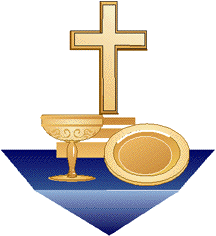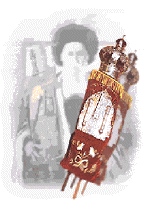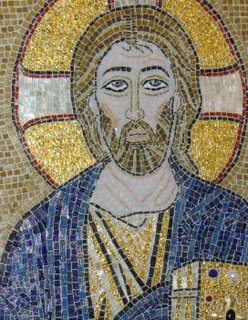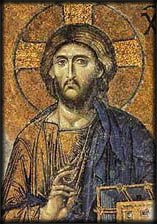Ateneo de Manila University, Loyola Heights, Quezon City, Philippines * An institution for theological and pastoral education conducted by the Philippine Province of the Society of Jesus (Jesuits)
22.4.06
Theo 237A God/Trinity (Yap)
Theo 237B God/Trinity (Guillen)
Theo 263A Christian Social Ethics (Genilo)
Theo 263B Christian Social Ethics (Intengan)
Theo 275 Philippine Church History (de Castro)*
Theo 289A Pastoral Psychology and Counseling (Gonzales)
Theo 289B Pastoral Psychology and Counseling (Gavino-Moraleda)
Elective
*Note: In place of Theo 275 Philippine Church History, non-Filipino students may take
Theo 274 History of Church in Asia: A Historical Survey (Guillen)
Class Schedule
Theo 218 Psalms (Keating)
Theo 253 Holy Orders (De Jesus & Tagle)
Theo 288.1 Advanced Pastoral Methods (M. Flores)
Theo Ad Auds Ad Audiendas Confessiones (Genilo, Eusebio, Mananzan.)
Theo Lit Presiding at Liturgy and Exams (Ofrasio)
Theo Syn 200.a Synthesis I (De Jesus)
Theo Syn 200.aFil Sintesis (JM Francisco)
Class Schedule
20.4.06
PrEng I EXPOSITORY WRITING & RESEARCH I (Tivnan)
Theo 206 INTRODUCTION INTO THE MYSTERY OF FAITH (TBA)
Theo 215 INTRODUCTION TO THE OLD TESTAMENT (Ramirez)
AUXILLARY COURSES
Special Workshop: RESEARCH TECHNIQUES FOR THEOLOGICAL LIBRARIES (Kroeger)
Theo Ad Auds AD AUDIENDAS CONFESSIONES (Genilo, Eusebio, Mananzan)
Theo Lit PRESIDING AT LITURGY (Ofrasio)
Theo Syn 200.a SYNTHESIS I (De Jesus)
Theo Syn 200.aFil SINTESIS (JM Francisco)
LANGUAGE COURSES
BG 201 BIBLICAL GREEK I (Schneider)
BG 203 BIBLICAL GREEK III (Schneider)
BH 201 BIBLICAL HEBREW I (Ramirez)
BH 204 BIBLICAL HEBREW IV (Ramirez)Theo 213.1 LATIN I (Mananzan)
 PrEng I
PrEng IEXPOSITORY WRITING
& RESEARCH I (3 units)
Catherine Tivnan-Oda
T Th 1:25 – 4:40 pm
This course focuses on developing and refining skills in writing papers that students need in effectively expressing themselves as an academic writer. The course is organized into three parts in increasing complexity: Sentence Skills, Paragraphing, and Research.
In strengthening students’ sentence skills, this unit includes reviewing grammar structures, sentence combinations, appropriate use of vocabulary and punctuation. Paragraphing is intended to refine students’ skills by employing the five patterns of expository writing (Comparison and Contrast, Process, Classification, Cause and Effect, and Definition) in a higher level concentrating on Theology and subjects of social relevance. Finally research writing empowers students to further develop their skills by creating their own report research paper. Throughout the course, an environment of writing as a process will be adopted to create clear, engaging and meaningful work.
 Theo 206
Theo 206INTRODUCTION INTO
THE MYSTERY OF FAITH (3 units)
Professor & Class Schedule: TBA
This course aims at an overview of the essential elements of the Christian Faith, providing a helpful background and preparation for proper theological study. Our recently Vatican-approved adult national catechism, doctrine, morals, and worship, the course includes practical exercises and a modest research project to foster active and fruitful student-assimilation of the fundamentals of the Faith.
 Theo 215
Theo 215INTRODUCTION TO THE OLD TESTAMENT
Felipe Fruto Ll. Ramirez, SJ
T Th 2:00 – 3:15 pm
This course begins with the study of the origin and formation of the OT books, the geography and culture of the Ancient near East, and the history of
Readings:Barry L. Bandstra, Reading the Old Testament: An Introduction to the Hebrew Bible, 2d ed. (Belmorst, CA: Wadsworth Publishing Co., 1999); Wilfred J. Harrington, Key to the Bible. Vol. 1: Record of Revelation (Garden City, New York: Doubleday, 1974); Terence Keegan, Interpreting the Bible (New York: Paulist Press, 1985).
 Special Workshop Course:
Special Workshop Course:RESEARCH TECHNIQUES FOR
THEOLOGICAL LIBRARIES
James Kroeger, MM
(no credit)
This practicum is designed to assist students in maximizing the use of a theological library, such as that of Loyola School of Theology (LST). It emerges from the practical, concrete need of students to effectively discover and use theological sources for writing research/synthesis papers, particularly theses and dissertations. Often, important resources are missed and considerable time is wasted, because students are unaware of the library's resources and they do not know how to systematically do research in a theological library.
This ten-hour "hands-on" practicum/worshop is offered periodically throughout the semester; no credit is given; however, a modest registration fee is asked. Individual professors may prescribe this practicum as a pre-requisite to doing a major paper or writing a thesis. Students who take this workshop should have been enrolled at LST for at least one semester.
The entire practicum will be offered on one weekend: Friday (1:00-4:45 PM); Saturday (8:00-12:00 NN and 1:00 - 4:45 PM). Each weekend session is limited to twelve students. The course will be offered three or four times during the semester to accommodate the needs of various students.
 Theo Lit
Theo LitPRESIDING AT LITURGY
Timoteo Ofrasio, SJ
2Q only: F 10:35-11:50 am; 2:00-3:15 pm
This course is designed to prepare “candidates for ordination” (diaconate, presbyterate) to exercise their new ministerial roles at the Eucharist and in various sacramental celebrations. Starting from a consideration of the “qualities of a good preside”, it involves the students in a practical demonstration of this role by focusing on different parts of the Mass and the other rites. As the day of diaconate ordination draws near, attention is given to the deacon’s role at Mass and as preside at baptism, marriage and blessings. All LST candidates for ordination are required to take and pass an examination demonstrating their ability to preside at liturgy in a competent, pleasing and prayerful manner.
 BG 201
BG 201BIBLICAL GREEK I (3 units)
Herb Schneider, SJ
M 2:00-4:40 pm
Living Koine Greek I. The course is designed for acquiring an active knowledge of the Koine Greek, the Greek of the Bible. The methodology is the modern approach to language learning. Through listening, pattern drills and memorization and acting out of dialogues in preparation for reading selected passages of the New Testament and other literature of the period the student acquires an active knowledge of the language. At the end of the course the student is prepared to begin reading the various books of the New Testament.

Prerequisite: Latin I
 BH 201
BH 201 BIBLICAL HEBREW I (3 units)
Felipe Fruto Ll. Ramirez, SJ
TBA
An introductory course to the language of the Old Testament. It covers chapters 1 – 23 of Thomas O. Lambdin’s Introduction to Biblical Hebrew, which deal with the alphabet, nouns, adjectives, prepositions, articles, pronominal suffixes, construct chains, and the QAL forms of the verbs. The students are expected to do the exercises in the textbook. Quizzes, oral reading practice, and periodic exams will be given to gain mastery of the language.


 BH 204
BH 204 BIBLICAL HEBREW IV (3 units)
Felipe Fruto Ramirez, SJ
TBA
This course consists in the translation and cursive reading of selections from the poetic texts of the Hebrew Bible—psalms, proverbs, and prophetic oracles—as well as selections from late Biblical Hebrew texts of Job and Qoheleth. It will also include discussions of topics on advanced grammar and syntax using Waltke-O’Connor’s An Introduction to Biblical Hebrew Syntax.
Prerequisites: BH 201, BH 202, BH 203
SS 220 OT EXEGESIS: SAMUEL-KINGS - SUCCESSION NARRATIVE (Ramirez)
SS 233 OT EXEGESIS: PSALMS (Keating)
SS 241A NT EXEGESIS: SYNOPTIC GOSPELS (Schneider)
SS 241B NT EXEGESIS: SYNOPTIC GOSPELS (Locker)
Theo 205A REVELATION-FAITH (MV Francisco - Yocum)
Theo 205B REVELATION-FAITH (Yap)
Theo 203 METHODS OF RELIGIOUS EDUCATION: MORALITY (Natividad)
Theo 207A CHRISTOLOGY (Kroeger)
Theo 207B CHRISTOLOGY (Lambino)
Theo 209B CHRISTIAN WORSHIP (Diwa)
Theo 209A CHRISTIAN WORSHIP (Ofrasio)
Theo 216A PENTATEUCHAL STUDIES (Graham)
Theo 216B PENTATEUCHAL STUDIES (Ramirez)
Theo 218 PSALMS (Keating)
Theo 225A SYNOPTICS (Schneider)
Theo 225B SYNOPTICS (Locker)
Theo 234 SCRIPTURE, TRADITION, MAGISTERIUM (Yocum)
Theo 236 / MTP 01 INTRODUCING THE THEOLOGIES OF MIGRATION (De Guzman)
Theo 237A GOD/TRINITY (Yap)
Theo 237B GOD/TRINITY (Guillen)
Theo 239A CREATION, SIN, ESCHATOLOGY (JM Francisco)
Theo 239B CREATION, SIN, ESCHATOLOGY (Macalinao)
Theo 238 CHRISTIAN TREASURES FROM THE FIRST CENTURIES (Godding)
Theo 244 LUKE-ACTS MARIOLOGY: A SYSTEMATIC AND SPIRITUAL APPROACH (Valdes)
Theo 248 / MTP 14 THEOLOGY OF MINISTRY (Chang)
Theo 253 HOLY ORDERS (Bp. Tagle & De Jesus)
Theo 260 EVANGELIZATION AND MORALITY (Giordano)
Theo 262.3 DIGNITAS PERSONAE AND THE DIGNITY… (McTavish)
Theo 263A CHRISTIAN SOCIAL ETHICS (Genilo)
Theo 263B CHRISTIAN SOCIAL ETHICS (Intengan)
Theo 272A CHURCH HISTORY I: FIRST TO THIRTEENTH CENTURY (De Castro - Godding)
Theo 272B CHURCH HISTORY I: FIRST TO THIRTEENTH CENTURY (A Flores)
Theo 275 PHILIPPINE CHURCH HISTORY (De Castro)
Theo 282.1 CIS MODULAR COURSE I: FOUNDATIONS FOR DIRECTED… (TBA)
Theo 282.2 CIS MODULAR COURSE II: FUNDAMENTALS OF... (TBA)
Theo 282.3 CIS MODULAR COURSE III: SUPERVISED RETREATS... (TBA)
Theo 282.4 CIS MODULAR COURSE IV: THE SPIRITUAL EXERCISES (TBA)
Theo 276.1 / MTP 12 JUSTICE AND MIGRATION (Battistella)
Theo 288.1A ADVANCED PASTORAL METHODS (Manuel Flores)
Theo 288.1B ADVANCED PASTORAL METHODS: MANAGEMENT... (Corros)
Theo 288.6 / Theo 346 THE REAL POWER OF MINISTRY (Ysaac)
Theo 289A / Sp89A PASTORAL PSYCHOLOGY & COUNSELI... (Gonzales)
Theo 289B / Sp89B PASTORAL PSYCHOLOGY & COUNSELI... (Gavino - Moraleda)
Theo 292.3 / Sp92.3 ASSESSMENT & INITIAL INTERVENTION (Rondain & Villasor)
Theo 293 / Sp93 MARITAL/PREMARITAL DYNAMICS & COUNSELING (Tanseco)
Theo 293.1A / Sp93.1A FAMILY DYNAMICS AND COUNSELING APPROACHES.(Siy)
Theo 293.1B / Sp93.1B FAMILY DYNAMICS AND COUNSELING APPROACHES.(Lumiqued)



- Have a thorough knowledge of the Gospel of Mark.
- Have a lesser, but adequate knowledge of Matthew and Luke over against Mark.
- Be acquainted with basic, pastorally oriented methods of working with the text of Scripture.
- With Matthew and Luke as guides, be aware what is involved applying the Gospel of Mark to people living in different circumstances, with different needs, and immersed in a different culture.
- A thorough reading of the Gospel of Mark, Matthew and Luke. This is foundational for the course and the basis for achieving specific aim 1 and 2.
- Group exegetical work and reports on certain passages. This helps course participants put into practice, the methods of working with the text taught in class and assures achievement of Specific Aim 3.
- Surveys of “pastoral constituents” about the Gospels and of Mark specifically. This is a prerequisite for Specific Aim 4.
- A group pastoral project of a Bible Study based on Mark for a specific group. This helps the participants concretely to achieve Specific Aim 4.

 Theo 205A
Theo 205A REVELATION-FAITH (3 units)
Manuel Francisco, SJ - John Yocum, DPhil
WF 9:00-10:15 am
Part I: Surveys the history of theology of revelation; analyzes revelation as event (words) and deeds of God in history), the content of revelation (historical, doctrinal, and mystery) and the transmission of revelation (through Scriptures and Tradition); studies the signs of revelation, the method of a biblical apologetic, and the faith of the Church concerning Jesus as the definitive revelation of God.
Part II: Studies the notion of faith according to the OT and the NT and to important theologians and Church councils; analyzes the nature and properties of faith, the object and content of faith, the interaction of divine grace and human freedom in the act of faith, the effect and responsibilities of faith, and the eschatological dimension of ecclesial faith.
 Theo 205B
Theo 205BREVELATION-FAITH (3 units)
Joaquin Yap, DPhil
WF 9:00-10:15 am
Fundamental theology endeavors to study the foundational reality of Christianity and theology, which is the revelation of God in Jesus Christ. This revelation seeks a response of faith from the human addressee.
Part I begins with an overview of the treatise on revelation, and examines successively: revelation as occurrence; revelation as doctrinal and historical; revelation as mystery; credibility and the signs of revelation.
Part II considers the biblical foundation of the profoundly human experience of religious faith. This is followed by a rather rapid survey of faith in the history of dogma and theology. The course ends with a theological reflection on the paradoxes of faith.
 Theo 203 / Theo 303
Theo 203 / Theo 303METHODS OF RELIGIOUS EDUCATION
Dr. Lucille Natividad
w 1:00-4:00 pm
This course us an evaluative study of various methods employed in current catechesis/religious education, as drawn from, and exemplified in, both official Church documents (NCDP, GDC, PCP II, etc) and RE sources. One synthetic method is then tested by applying it to the current efforts toward a closer integration of Catholic morality with Catholic spirituality.
 Theo 207A
Theo 207ACHRISTOLOGY (3 units)
James Kroeger, MM
T 8:00-10:15 am
Christology is the systematic faith reflection on the person, ministry, teaching, and significance of Jesus the Christ. This foundational course treats basic Christological
Brief Bibliography: Rausch, T. and Kroeger, J. Who Is Jesus: An Introduction to Christology (New Philippine Edition). Quezon City: Claretian Publications, 2005; Senior, D. Jesus: A Gospel Portrait (Revised and Expanded Edition). Makati: St. Paul Publications, 1997; Zanzig, T. Jesus the Christ: A New Testament Portrait. Winona: Saint Mary’s Press, 2000.
Note: This course meets four hours weekly to allow for short absences of the professor for FABC, CBCP, and AMSAL commitments.
 Theo 209B
Theo 209BCHRISTIAN WORSHIP (3 units)
Genaro Diwa
T 8:00 am – 11:00 nn
An introduction to the liturgical and sacramental life of the Church. Beginning with the experience of worship and ritual in human life, it then considers the nature and scope of liturgy, its Trinitarian dimension, the liturgical assembly and various component elements of celebration. Key principles of sacramental theology are explained with a view to further study of the individual sacraments.
 Theo 216A / Theo 315A
Theo 216A / Theo 315APENTATEUCHAL STUDIES (3 units)
Helen Graham, MM
T 8:000-11:00 am
 Theo 216B / Theo 316B
Theo 216B / Theo 316BPENTATEUCHAL STUDIES (3 units)
Felipe Fruto Ll. Ramirez, SJ
MTh 9:00-10:15 am
This course deals with the history of Pentateuchal research; the themes that bind the Pentateuch together; and the Levitical and Deuteronomic theologies of those who have written, compiled, and edited Pentateuch. This course also includes exegesis and rhetorical analysis of some key passages in Pentateuch.
Course bibliography: Joseph Blenkinsopp, Pentateuch: An Introduction to the First Five Books of the Bible, New York:
Doubleday, 1992; J.P. Fokkelman, Narrative Art of Genesis, 2nd ed.; Sheffield: Academic Press, 1991; Rolf Rendtorff, Old Testament: An Introduction, London: SCM, 1985; Jean Louis Ska, “Our Fathers Have Told Us: An Introduction to the Analysis of Hebrew Narratives, Rome: Editrice Pontifico Biblico, 1990; John van Seters, Prologue to History: The Yahwist as Historian of Genesis, Louisville, Kentucky: WJK, 1992; R.N. Whybray, Making of the Pentateuch: A Methodological Study, Sheffield: Academic Press, 1987.
 Theo 218 / Theo 318
Theo 218 / Theo 318PSALMS (3 units)
John Keating
TF 9:00-10:15 AM
Psalms are poems, prayers, and songs. This course involves close reading of texts along with study of modern resources. We will focus on paradigms of types of prayer that arise out of human experience and religious faith. The approach is literary, historical, and theological. Our goal is to respond to the beauty and spirituality of the Psalms in their original context, and also to appreciate their continued vitality in Christian thought, liturgy, and music.
 Theo 225A / Theo 325A
Theo 225A / Theo 325ASYNOPTICS (3 units)
Herb Schneider, SJ
M 9:00-11:50 am
In the Church’s cycle of Scripture readings for the liturgy, Year B is devoted to the Gospel of Mark. Thus this year’s Synoptics course focuses primarily on the Gospel of Mark. The Gospel, however, will be studied synoptically, i.e. importance will be given not only to what Mark said about Jesus and his mission, but also how Matthew and Luke, the earliest “commentators” interpreted the Gospel of Mark.
At the end of the course, the course participants should:
- Have a thorough knowledge of the Gospel of Mark
- Have a lesser, but adequate knowledge of Matthew and Luke over against Mark
- Be acquainted with basic, pastorally oriented methods of working with the text of Scripture
- With Matthew and Luke as guides, be aware what is involved applying the Gospel of Mark to people living in different circumstances, with different needs, and immersed in a different culture.
- A thorough reading of the Gospel of Mark, Matthew and Luke.
- This is foundational for the course and the basis for achieving specific aim 1 and 2.
- Group exegetical work and reports on certain passages. This helps course participants put into practice, the methods of working with the text taught in class and assures achievement of Specific Aim 3.
- Surveys of “pastoral constituents” about the Gospels and of Mark specifically. This is a prerequisite for Specific Aim 4.
- A group pastoral project of a Bible Study based on Mark for a specific group. This helps the participants concretely to achieve Specific Aim 4.
 Theo 225B / Theo 325B
Theo 225B / Theo 325BSYNOPTICS (3 units)
Dr. Markus Locker, PhD
M 11:10 – 12:00 nn
F 9:00 – 11:00 am
A study of the Synoptic Gospels, with the focus on the Gospel of Mark with the treatment of Matthew as time allows. The Gospel of Mark will be studied in its own right and in the light of the way Matthew and Luke used the Markan material in their gospels. This historical-critical method will be used throughout, but supplemented with other contemporary biblical methodologies.
 Theo 234
Theo 234SCRIPTURE, TRADITION,
MAGISTERIUM (3 units)
John Yocum, DPhil
W 2:00-4:40 pm
Fundamental theology endeavors to study the foundational reality of Christianity and theology, which is the revelation of God in Jesus Christ. This revelation seeks a response of faith from the human addressee. (This is the subject matter of Theo 205).
This present course, also included in fundamental theology, deals with the transmission of revelation through the ages, that is, Sacred Scripture and Sacred Tradition, as well as its authoritative proposition and interpretation through the Church’s magisterium. Hence, the three constitutive parts of this course will be concerned with giving a theological description and dogmatic explanation of, respectively, Scripture, Tradition and Magisterium.
 Theo 236 / MTP 01
Theo 236 / MTP 01INTRODUCING THE THEOLOGIES
OF MIGRATION (3 units)
Dr. Emmanuel de Guzman, PhD
Th 2:00 – 4:40 pm
The course focuses on methodological approaches in doing a theology of migration. It begins with anthropological-sociological perspectives to understanding the migrants’ experiences, and then deals with samples of attempts at doing systematic theologies form the migrants’ contexts. Students will participate in the construction of theologies for and with the migrants.
 Theo 237A
Theo 237AGOD/TRINITY (3 units)
Dr. Joaquin Yap, DPhil
T
This doctrinal-pastoral course on the living God of Christian faith seeks to understand, interiorize, and proclaim the Trinitarian mystery as the central vivifying truth which responds to the deepest questions of the human heart. After a brief consideration of the present-day context of unbelief, the course gives a systematic exposition of the doctrine of the Trinity by means of Scripture and Tradition. The concluding lectures underline the pastoral dimensions of this doctrine which is meant to be the "deepest source, closest inspiration and the brightest illumination of the meaning of life that we can imagine" (Leonardo Boff).
Maximum number of credit students: 20
GOD/TRINITY (3 units)
Fernando Guillen, SchP
WThF 8:00-8:50 am
The Mystery of God: An Inquiry on Holy Trinity. The capital aspect of the Christian creed, which summarizes and enlightens the whole faith is the mystery of the Most Holy Trinity. Indeed, we discover there the everlasting source of the design of salvation, the deep meaning of the Incarnation of the Word, and the final horizon of the History of Mankind. Our course intends to explain the Trinitarian problem in Asian context today, to analyze the biblical and historical data about the Holy Trinity with clarity and precision, and to summarize briefly the meaning of the Catholic teaching on the Holy Trinity.
Bibliography: Holy Bible. Neuner, J. - Dupuis, J. The Christian Faith. Bangalore: Theological Publications in India, 2001. Forte, B. The Trinity as History. New York: Alba House, 1989. Lonergan, B. The Way to Nicaea: The Dialectic Development of Trinitarian Theology. Still River, Mass.: St. Bede's Publication, 1982. O'Collins, G. The Tripersonal God: Understanding and Interpreting the Trinity. New York: Paulist Press, 1999. Rahner, K. The Trinity. London: Burns & Oates, 1970.





